
THIS POST INCLUDES:
——————————————–
- When anger is a problem
- Behavioral signs that you are angry
- Learn to become less Angry
- Using Reiki to deal with anger
- FREE DOWNLOAD Release the Anger Exercise
WHEN ANGER IS A PROBLEM
We all experience times of frustration and annoyance, however, for some people this can become a problem if anger is felt over a long period of time. You may be experiencing a degree of extended anger where you’re no longer aware that you are exhibiting behaviors that show you are angry.
In this blog post, you will learn about some of the most obvious behavioral signs of anger to look out for in your own daily living.
You will also learn how to become less angry and use the benefits of Reiki to achieve this goal.
Anger should not be viewed as an entirely negative emotion. Anger is often an expected and understandable emotion in some situations. If we are able to process a situation in a healthy manner, we usually move through a period of acceptance which will help us move on from the feelings of anger.
If we stay angry for an extended period we become affected both psychologically and physically. Once we have reached a point of experiencing these significant negative effects from anger, it can be difficult to identify and acknowledge how anger is affecting us, our families, and our social circles.
BEHAVIORAL SIGNS THAT YOU ARE ANGRY
Anger can be an outward sign that a situation is negatively affecting us. If this situation is short lived, we can usually return our emotions back to normal functioning shortly after. Sometimes a negative situation may be ongoing such as excessive demands of a job or close family member. Anger in short-term events is easier to detect and more quickly abates once the event is over. Long-term anger can often present in less subtle behaviors which are listed below:
SWEATING THE SMALL STUFF
The small stuff in life usually relates to the everyday occurrences in life that are part of our routines and activities that help us function in life. Having enough milk for your coffee, finding a parking space close to work, and not being cut off in traffic all equate to the small stuff. We know they are small because on any given day they don’t actually bother us, but some days they are like waving a red flag to a bull. We can’t believe the tragedy of these situations occurring! You know something is the small stuff when you realize this situation hasn’t really bothered you 100 times before, but today for some reason it does!
Being angry over these situations indicates you need to look for a bigger picture. Were you already in a bad mood before this minor thing happened? Is there some connection to this small event happening that represents a larger problem. For example, you might have had a big fight with your partner last night and found they used all the milk before you had a coffee now enrages you because you were already angry and this situation further justifies your anger at your partner.
DISRUPTIVE
People who are angry become disruptive in conversations and demands for their needs to be met. They dismiss other people’s priorities and become frustrated at anything that appears as an obstacle in their path of getting what they need.
FAULT FINDING
People who are angry can easily find fault with a situation, people, and even inanimate objects. Angry people will constantly complain about how they are treated by people whether it be family and friends, or businesses. Their complaints are often loud and seek to disrupt the situation so that their demands can be met. Angry people will constantly find fault with a situation and catastrophize the impact it has on them.
RESENTMENT
Angry people will carry resentments for a long period of time and focus on blaming others while magnifying the impact the situation has had on them. It is natural to be angry about specific situations, however, not dealing with feelings of anger can lead to resentment. Once resentment begins to develop, it can be difficult to break down the barriers to resolving conflict because resentment impedes the process of acceptance and forgiveness.
LACKS EMPATHY
An angry person can find it difficult empathize with other people as they are focused on their own feelings of anger.
LEARN TO BECOME LESS ANGRY
It is hard to become less angry when you are in the middle of a stressful event and experiencing a high level of emotion. As you learn about your feelings of anger and how you cope with stressful situations, you can begin by preparing yourself before a stressful event and exploring your reactions after a stressful event. This exploration before and after an event will help you develop insight into the way in which you react with anger and how you can mitigate this happening in the future.
Dealing with potential feelings of anger before a stressful event is only useful when you know an event is coming up. This might include visiting a family member you don’t get along with or dealing with an organization or business about a transaction gone wrong.
Below are some tips that will help you gradually become less angry over time. It is important to remember that behavioral changes take time, so if you find yourself becoming angry at someone try not to punish yourself for not handling it as well as you had intentioned.
Exercise – regular exercise helps to release daily stresses so that they are less likely to accumulate into a major explosion. A brisk walk will help you burn energy quickly. A slow walk will help you focus less on your internal thoughts and more on your environment. Take a slow walk in nature to help create a positive mood. If you are unable to walk, you can engage in weightlifting exercises that will also help release energy.
Swinging a kettlebell is an excellent exercise that can be done in a short period of time in the comfort of your own home or office. For tips on using a kettlebell watch this video: Kettlebell Swing Tim Ferriss
Meditate – engage in a regular practice of meditation. Meditation does not have to be done in lengthy sessions. You can meditate for 5 mins to help clear your mind and develop focused attention if you are feeling pressured.
Imagine the scenario – if you are about to enter a potentially stressful situation, take some time before the event to imagine how you will handle any potential difficult conversations. Be careful not to engage in assuming specific outcomes, but instead use this as an opportunity to develop the necessary skills you need to handle any conflict that might arise.
Express yourself – remember that you want to express your point of view, not your anger. Conveying your anger to another person only shows them how upset you are, however, it doesn’t express your frustrations and thoughts about the situation. If you want another person to understand your point of view, express yourself clearly.
Understand your triggers – think about what makes you angry. Is it dealing with specific people or events? Is it when you find yourself in situations involving specific conflicts. If you can understand the triggers behind your anger, this will help you to develop a strategy when faced with those people or situations in the future. Insight and awareness are important aspects of making behavioral change.
Avoid blaming – often when we are angry, we immediately look for someone or something to blame to help us to distract ourselves from the intense emotions we are feeling. If we are able to shift the focus towards someone else or something, it means we can avoid having to look at our own thoughts and behaviors which makes us feel like we are not in control.
Forgive – Drop the grudge, forgive and forget! When you hold a grudge the only person affected is you! I use the term “nobody ever dies from a snake bite, it’s the venom inside that kills” And wow does it! Your venom inside that you hold onto causes you upset, causes you to feel angry and impacts your life.
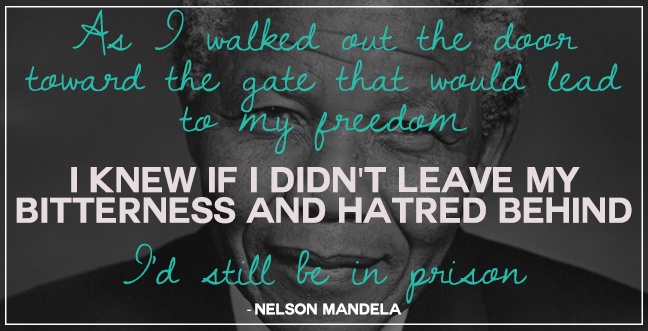
Relax – engage in techniques for relaxation, including Reiki, breathing, and meditation.
USING REIKI TO DEAL WITH ANGER
Reiki helps us to become calm and reflect on our emotional state. Below are a few exercises to help you work through your feelings of anger using Reiki and other useful relaxation techniques.
RELEASE THE ANGER:
Allow yourself at least 10 minutes to conduct this exercise, however, 30 minutes would be ideal.
- Find a favorite place and create a calm environment using some of your favorite sounds and smells using relaxing music and candles or incense. You can lie down or sit comfortably.
- Take 5-10 slow breaths to help calm your nervous system down so that you can become fully present to participate in the exercise
- As your breath becomes calmer, take this opportunity to complete a mental body scan starting from the top of your head and down to your toes. Focus your attention on each body part and take notice of any tension that you feel in each area. If you notice a high level of tension in a specific area, use your breathing techniques to release the tension. You may also want to clench your muscles tightly around that area and then let them go to release the tension. Typical areas for holding tension include your neck, shoulders, back, jaw, chest, and stomach.
- Use the Reiki symbol of emotions Sei He Ki (pictured below) over the area where you feel the tension.

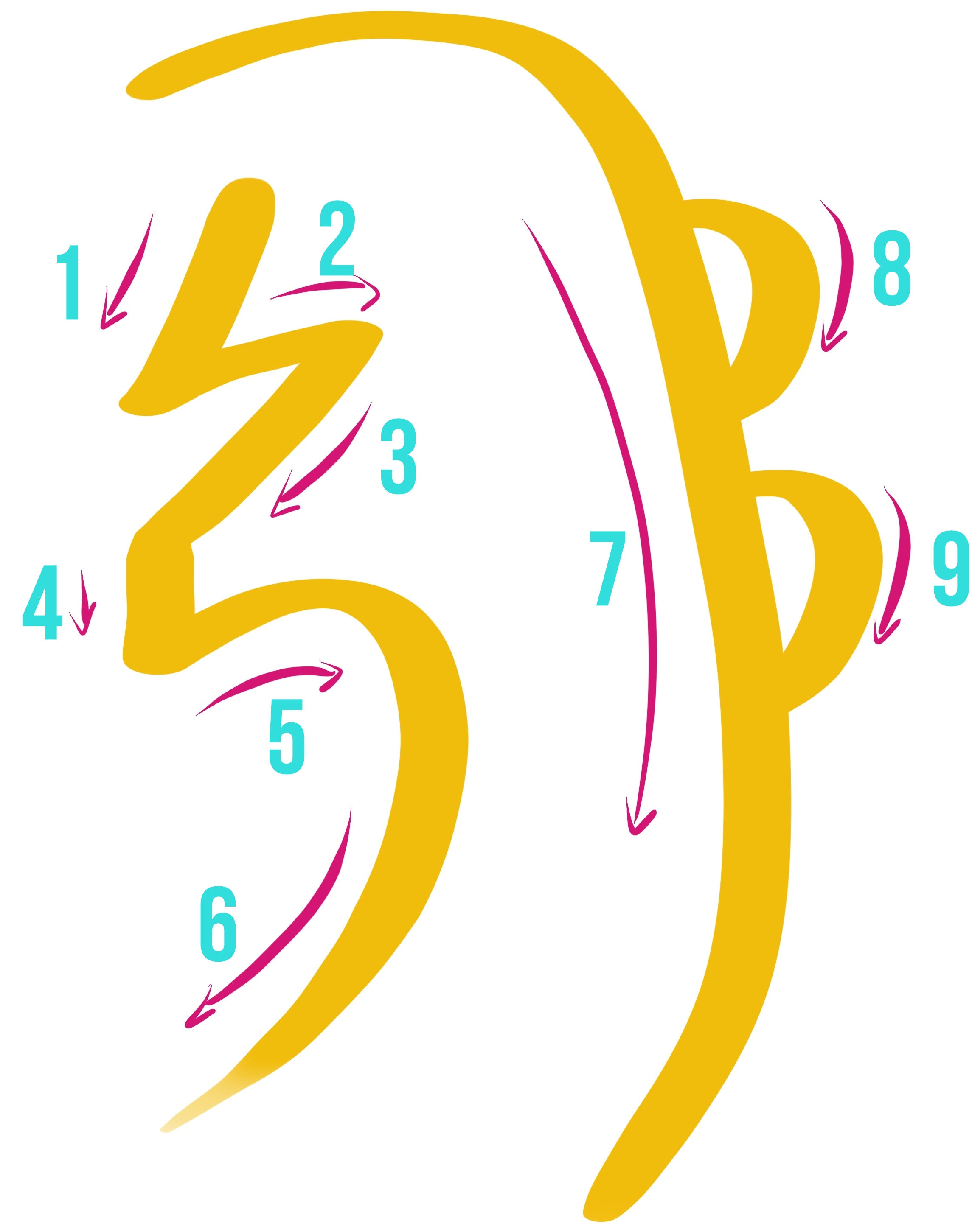
- After you have completed your body scan reflect on whether you still hold any residual anger. If you still feel anger redo the breathing exercises and body scan. If you notice any further tension in your body use the Reiki power symbol, Choku Rei (pictured below). As you draw the power symbol, repeat a positive affirmation stating that you release the anger from your body and release its power over you. Repeat this process until you feel the anger release.
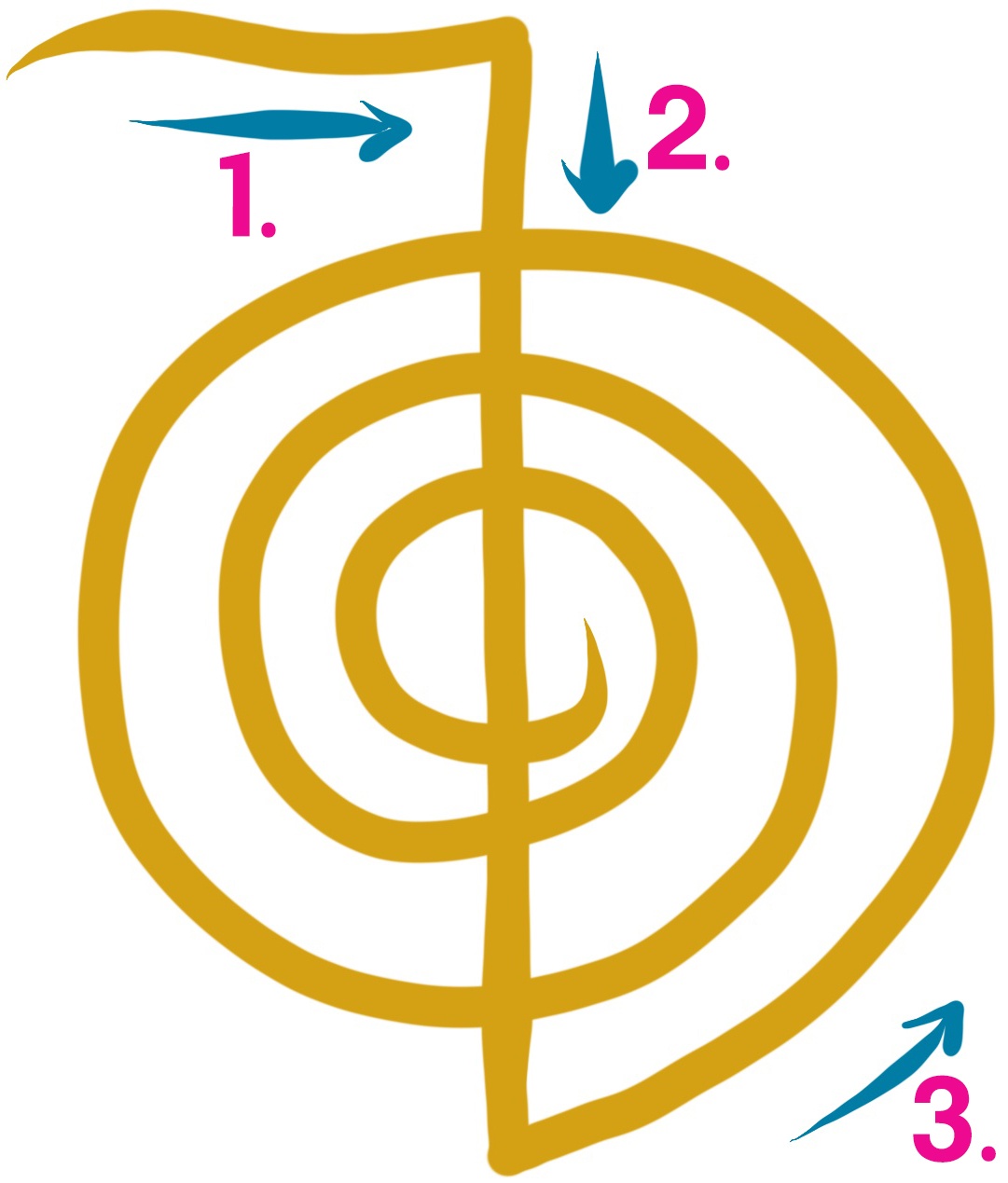
- Once you have completed this anger release exercise, remain for a further 5 minutes to allow your body to relax and restore its energy. Keep your eyes closed and focus on your breath coming in and going out. Slow your breathing down to help keep your nervous system calm.
- If you start to have any thoughts that relate to the event or person that made you angry, repeat your positive affirmation statement of releasing the anger and its power over you.
- When you are ready, return to your daily activities with a renewed sense of gratitude and positivity.
LOVINGKINDNESS MEDITATION:
Allow yourself at least 10 minutes to conduct this exercise, however, 20 minutes would be ideal.
A useful meditation you can undertake is called Lovingkindness Meditation. This meditation helps to encourage a feeling of love and kindness towards ourselves and others. Each statement helps to express an intention of good wishes that help to diffuse feelings of anger and resentment.
- Find a favorite place and create a calm environment using some of your favorite sounds and smells using relaxing music and candles or incense. You can lie down or sit comfortably.
- Take 5-10 slow breaths to help calm your nervous system down so that you can become fully present to participate in the exercise
- Begin by directing lovingkindess to yourself and repeat the following mantra:
May I be filled with lovingkindness.
May I be safe from inner and outer dangers.
May I be well in body and mind.
May I be at ease and happy.
Once you have completed your statements towards yourself, direct your statements of lovingkindness towards the person you are angry at:
May you be filled with lovingkindness.
May you be safe from inner and outer dangers.
May you be well in body and mind.
May you be at ease and happy.
You may find this lovingkindness mediation helpful to get you started.
FREE DOWNLOAD
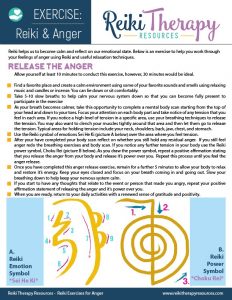
BUILD YOUR REIKI REFERENCE MATERIALS:
Pin this image to your Pinterest board.
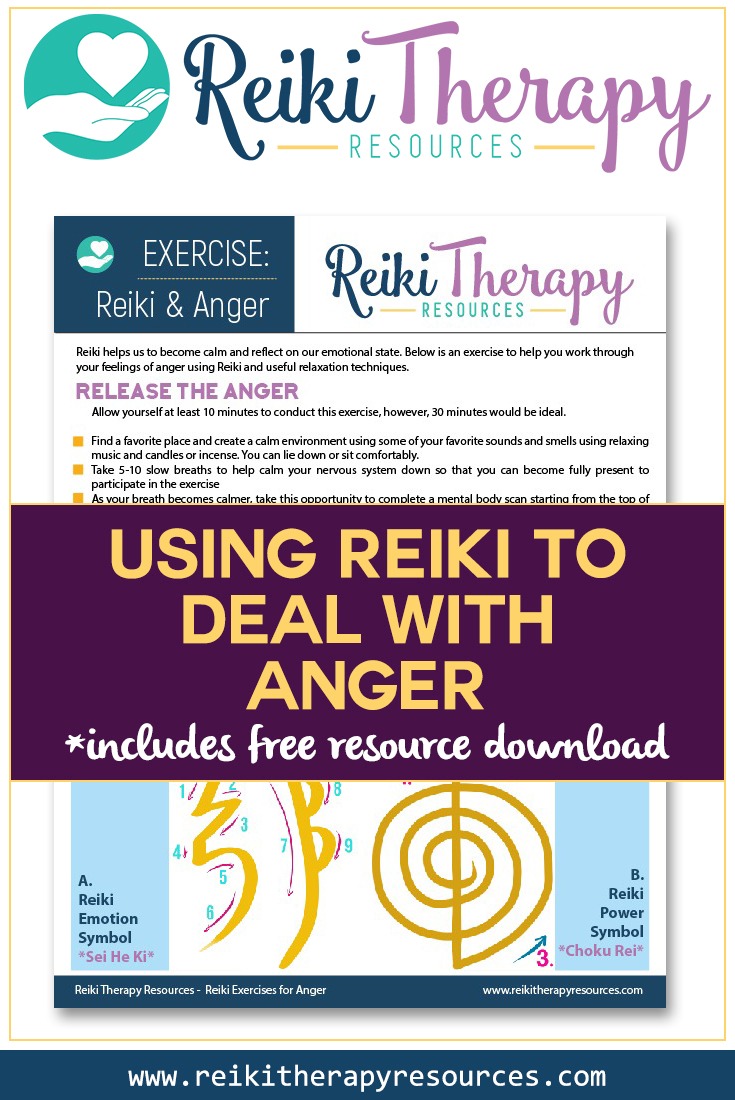
SHARE KNOWLEDGE & PASS IT ON:
If you’ve enjoyed this post, please share it on Facebook, Twitter, Pinterest. Thank you!
